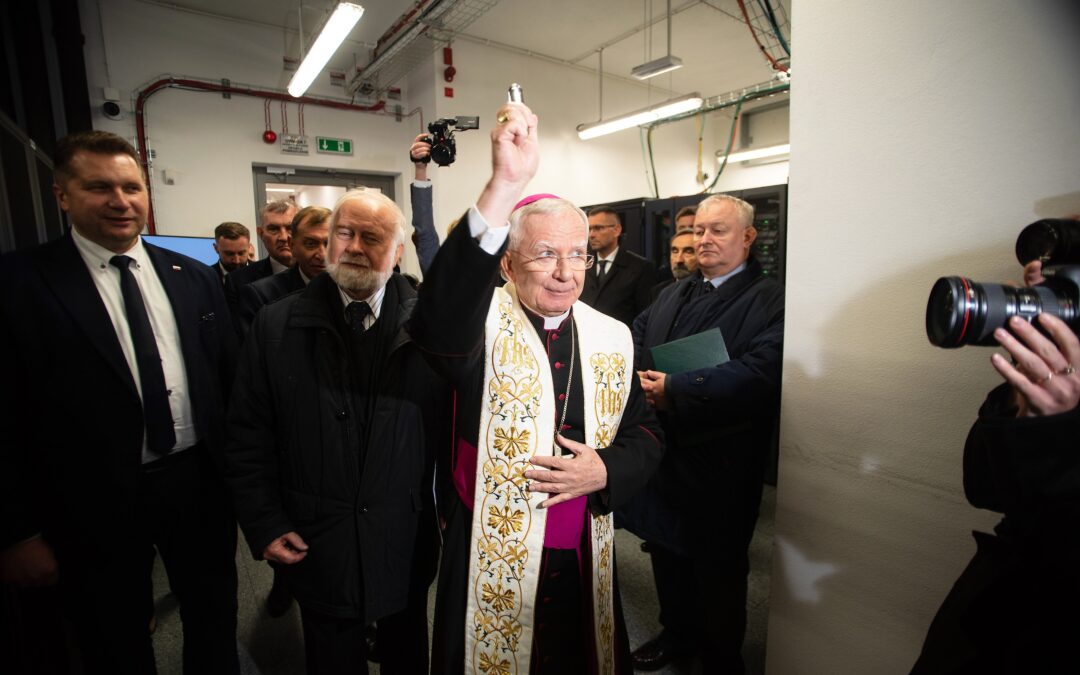Poland’s fastest supercomputer has been unveiled at the Kraków university where it is located. Among the guests at the ceremony, which took place at the start of the new academic year, was the city’s archbishop, who blessed the centre where the computer is housed, and the education minister.
With a theoretical power of over 7.7 petaFLOPS, the Athena supercomputer at the Academic Computer Centre Cyfronet of AGH University of Science and Technology, a public university, is the 105th fastest in the world.
As Cyfronet director Kazimierz Wiatr noted, it is also ninth on the Green500 list of the most ecological supercomputers in the world, which AGH’s previous supercomputers, Zeus and Prometheus, also feature on.
Oprócz inauguracji, w #AGH oficjalne uruchomienie naszego superkomputera #Athena.
To obecnie najszybszy superkomputer w Polsce, 105 na liście TOP500 oraz 9 na liście Green 💚🖤❤️ pic.twitter.com/kEEGBkgfG9
— AGH Kraków (@AGH_Krakow) October 4, 2022
Such machines cut the time required for calculations that would take ordinary computers hundreds of years to complete to a matter of hours or days, reports Gazeta Wyborcza. Athena is to be used for standard high-performance computing (HPC) as well as artificial intelligence (AI) and machine learning (ML).
Wiatr explained that Athena, which can be used for free by scientists in Poland, has already completed test calculations involving coronavirus and vaccination research as well as tasks involving computational medicine, such as a platform supporting clinical diagnostics and child cancer therapies.
During his remarks, Wiatr also cited Polish Pope John Paul II. “We know that John Paul II did not distance himself from modern technologies and from dialogue with science. And we have no doubt that in this enormous development of science, and particularly information science, we must remember about values.”
Wiatr’s presentation was followed by a speech by Marek Jędraszewski, the archbishop of Kraków, who then blessed the Academic Computer Centre and Athena. The opening of new infrastructure or other facilities in Poland is often accompanied by a blessing from a Catholic priest.
Jędraszewski referred to the advances of science, citing Galileo and Blaise Pascal, before also quoting the former pope. “The world is always revealing ever newer mysteries,” he said . “But we must not forget about the mystery with a large ‘M’ – about God.”
“As long as man remains open to mystery and respects it, there will be a chance that this will serve man and humankind – it will not turn against him but be a manifestation of the great fascination that the world continues to be for us,” added the archbishop.
🖥Najszybszy komputer w Polsce uruchomiony w AGH
Superkomputer Athena został uruchomiony podczas inauguracji roku akademickiego 2022/2023 w @AGH_Krakow. Wojewoda @Lukasz_Kmita🇵🇱 odczytał list @MorawieckiM skierowany do uczestników wydarzenia.
Więcej➡ https://t.co/21MPyYXoqc pic.twitter.com/NTMunJOoDq
— Małopolski Urząd Wojewódzki 🇵🇱 (@Malopolski_UW) October 5, 2022
Marek Magryś, Cyfronet’s deputy director for HPC, told RMF24 that the new supercomputer, which cost 20 million zloty (€4.15 million) to build, not including infrastructure costs, opens new horizons in various branches of science.
“Athena’s power is equivalent more or less to 40,000 very powerful home computers,” she explained. “But it offers possibilities that could not be achieved if we simply put those home computers in one room.”
The inauguration of the 104th academic year at AGH, currently ranked as Poland’s joint fourth best university, was also attended by the education minister, Przemysław Czarnek.
In response to concerns voiced by Polish universities – including AGH – that they will struggle to pay rocketing energy bills, Czarnek claimed that the problem is the result of “the absurd green policy imposed by the European Union in recent years…of the EU’s lunacy”.
Main image credit: Michał Maciejewski / Agencja Wyborcza.pl

Ben Koschalka is a translator, lecturer, and senior editor at Notes from Poland. Originally from Britain, he has lived in Kraków since 2005.




















